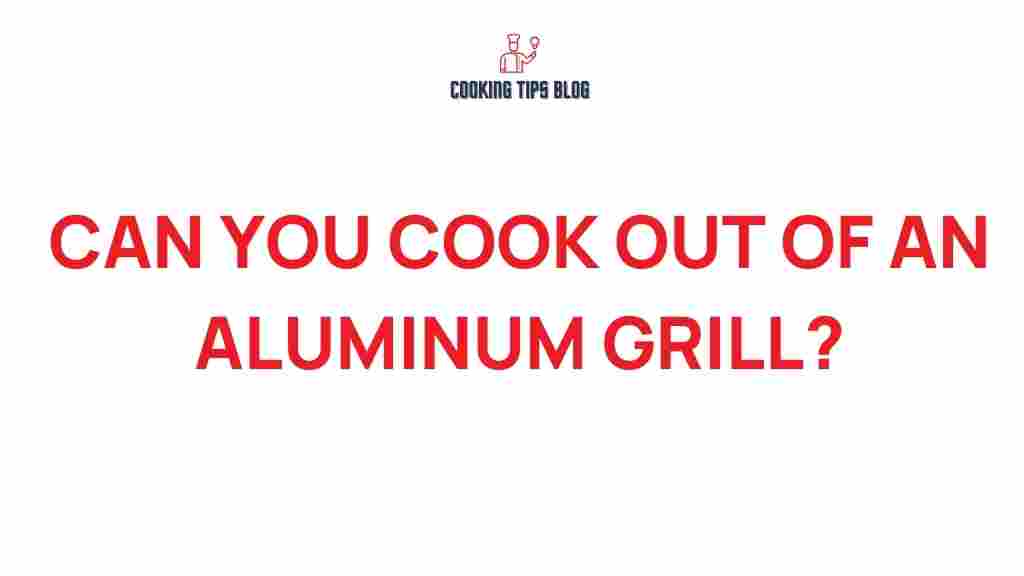Unveiling the Truth: Can You Cook Effectively on an Aluminum Grill?
Grilling is a cherished pastime for many, especially during the warmer months. Whether you’re a novice or a seasoned pro, the type of grill you choose can significantly affect your cooking experience. One option that has gained popularity is the aluminum grill. But can you really cook effectively on an aluminum grill? In this comprehensive guide, we’ll explore the advantages and disadvantages of using an aluminum grill, provide a step-by-step cooking process, troubleshoot common issues, and finally, offer a conclusion to help you decide if an aluminum grill is right for you.
Why Choose an Aluminum Grill?
Aluminum grills have garnered attention for several reasons:
- Lightweight: Aluminum is significantly lighter than other materials like steel or cast iron, making it easy to transport and handle.
- Corrosion Resistance: Aluminum naturally resists rust, which can prolong the lifespan of your grill.
- Even Heat Distribution: Aluminum conducts heat well, allowing for consistent cooking temperatures.
- Cost-Effective: Generally, aluminum grills are more affordable than their stainless steel or cast iron counterparts.
However, before you rush to purchase one, it’s essential to understand both the benefits and potential drawbacks of cooking on an aluminum grill.
Potential Drawbacks of Aluminum Grills
While an aluminum grill has its advantages, there are some downsides to consider:
- Less Durability: Aluminum can dent and scratch more easily than other materials, which may affect its appearance over time.
- Heat Retention: Although aluminum heats up quickly, it also cools down faster than cast iron, which can be a disadvantage for certain cooking techniques.
- Potential Reactions with Food: Cooking acidic foods, such as tomatoes or citrus, may cause aluminum to react, impacting the flavor of your dish.
Step-by-Step Cooking Process on an Aluminum Grill
If you’ve decided to give an aluminum grill a try, follow these steps to ensure a successful grilling experience:
1. Preheat the Grill
Before you start cooking, it’s crucial to preheat your aluminum grill:
- Turn on your grill and set it to medium-high heat.
- Let it heat up for about 10-15 minutes. This step ensures that your food cooks evenly.
2. Prepare Your Ingredients
While the grill is heating, prepare your food:
- Marinate or season your meats and vegetables according to your preferences.
- Cut your ingredients into uniform sizes to promote even cooking.
3. Oil the Grill Grates
To prevent sticking and ensure easy cleanup, oil the grill grates:
- Use a paper towel soaked in vegetable oil and carefully wipe the grates.
- Alternatively, you can use a non-stick spray designed for grilling.
4. Cook Your Food
Now it’s time to start grilling:
- Place your food on the grill and close the lid to retain heat.
- Use tongs to flip your food as needed, ensuring even cooking on all sides.
- Monitor cooking times and temperatures using a meat thermometer for best results.
5. Let it Rest
After cooking, allow your food to rest for a few minutes before serving. This step helps retain moisture and enhances flavor.
6. Clean the Grill
Cleaning your aluminum grill after use is essential for maintaining its quality:
- Wait for the grill to cool down slightly.
- Use a grill brush to scrub off any residue.
- Wipe the grates with a cloth and mild soap if necessary.
Troubleshooting Common Issues with Aluminum Grills
Even with the best preparation, you may encounter some challenges while cooking on an aluminum grill. Here are common problems and their solutions:
1. Food Sticking to the Grate
If your food is sticking, try these solutions:
- Ensure you oil the grill grates before cooking.
- Preheat the grill adequately before placing food on it.
2. Uneven Cooking
To address uneven cooking, consider the following:
- Make sure to preheat your grill properly.
- Turn and move food around to ensure even exposure to heat.
3. Grill Temperature Too High or Too Low
If you’re struggling with temperature control:
- Adjust the heat settings on your grill as needed.
- Use a grill thermometer to monitor the temperature accurately.
4. Damage to the Grill Surface
To prevent damage to your aluminum grill, follow these tips:
- Avoid using metal utensils that can scratch the surface.
- Store the grill in a protected area if possible.
Conclusion: Is an Aluminum Grill Right for You?
In conclusion, cooking on an aluminum grill can be both effective and enjoyable when done correctly. It offers numerous advantages, including portability, cost-effectiveness, and good heat conduction. However, it’s essential to be aware of its limitations, especially regarding durability and potential food reactions.
If you follow the outlined steps for cooking and troubleshooting, you’ll likely find that an aluminum grill meets your grilling needs. Whether you’re grilling burgers, vegetables, or seafood, an aluminum grill can deliver satisfying results.
For more tips and tricks on grilling, check out our comprehensive guide on grilling techniques. If you’re interested in purchasing an aluminum grill, make sure to read customer reviews and consider the specific features that will best suit your culinary adventures.
Happy grilling!
This article is in the category Tools and created by Cookingtipsblog Team
